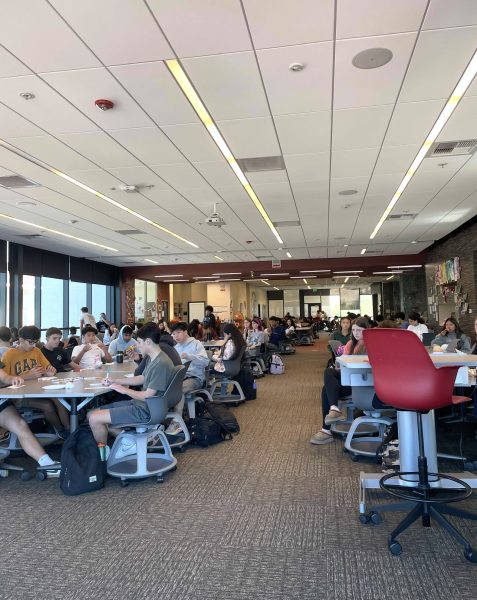Performative activism: The newest threat to Black Lives Matter
In a large show of support for the Black Lives Matter (BLM) movement, millions of social media users posted a black screen under the hashtag #BlackOutTuesday on June 2. Despite this, there has been a substantial decrease in the amount of people actively backing BLM and fighting for social justice on social media in the months since Blackout Tuesday.
After the well-publicized deaths of Ahmaud Arbery, George Floyd, and Breonna Taylor, there was a drastic increase in activism and support on social media for the Black Lives Matter (BLM) movement. Yet, we couldn’t help but notice that the initial spike in activism in June of 2020 consisted largely of people treating BLM as the newest social media trend.
Performative activism, the act of supporting a movement just for the sake of that individual’s social capital and not genuinely for the issue at hand, has become a new norm on social media. Social media events such as Blackout Tuesday — a trend that occurred on June 2 in which people posted a black square under the hashtag #BlackoutTuesday — have given Instagram users the opportunity to prove that they are ‘not racist’ to their followers.
“I feel like [performative activism] feeds into the idea that Black Lives Matter is a trend — which it’s not,” said senior Sydney Wanguhu, co-president of the Black Student Union (BSU). “You can’t call someone’s life a trend. It hurts a lot to see that [we’re] very vocal about this [issue], but the end goal — the root of the problem — is still not going to be fixed.”
Not only does performative activism take attention away from those who are actively involved in the BLM movement, but it also makes it extremely easy for people to voice an opinion that they don’t actually hold. In other words, performative activism allows people to preserve their reputation by posting content that they think will please their viewers.
“I don’t think that you should post [about BLM] if you don’t believe in it or if you’re just trying to look good in appearances,” said Iziyah Robinson, former Black Student Union member and local activist. “But publicity is publicity, whether we like it or not. If you post something on your story, someone is going to see it and repost it.”
Although performative activism does increase the amount of people viewing posts in support of BLM on social media, it can also create opportunities for misinformation to spread. By publicizing such misinformation under the name of BLM, the movement can easily be discredited to the viewers of those posts.
“Even if something sounds true, look it up,” Robinson said. “It takes two seconds to go to Google and type in a question. If you see a reliable source that posted [the information], then you’re good. But don’t post it and say it as a fact when you don’t know if it is.”
However, even though performative activists post for personal gain, some argue that the content that they share — links to petitions and news from reliable media sources — still pushes the same message that committed activists stress.
“While it hurts me to see people only [post] for themselves, or to fit in, or to be part of a trend, I think it’s better than if they didn’t say anything at all,” said senior Owen Callison, a member of the BSU. “At least ‘showing’ your support means more than saying nothing.”
However, there are other ways that you can show your dedication to the BLM movement beyond the facade that people display on their social media accounts.
“Make your own content,” Robinson said. “Use technology in any way you can and be creative through that, and change will come eventually.”
Attending protests, signing petitions, sending emails to your representatives, and taking the time to research the many issues that BLM is trying to address will all solidify your position as an activist much more than posting a black square will.
“If you truly believe in [BLM] then why don’t you come to our protests?” Wanguhu said. “If you truly believe in [BLM], why don’t you join the BSU? I have been very skeptical with people over this last summer. People have reached out to me saying they completely support [BLM] but yet, they’re still doing x, y, and z which contradicts what they told me.”
But it is also important to note that, if your beliefs conflict with the political platform behind the BLM movement, you should not feel pressured into broadcasting an opinion that you don’t agree with.
“I don’t think that you should post [political and social opinions] if you don’t believe it, or if you’re just trying to look good in appearances,” Robinson said. “If you want publicity then great, I don’t care, but if you want people to actually recognize the things that are going wrong and actually improve on things, then don’t post unless you believe what the post is saying.”

Seta Salkhi is a senior in her third year of the journalism program. As this year’s managing editor,...

Mason Hanshaw is a senior at Monte Vista and is the Editor-in-Chief for the 2020-21 school year. Mason...







